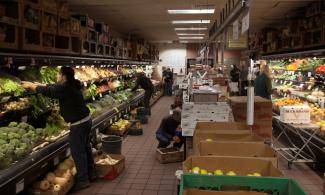
A Community Conversation about the Park Slope Food Co-op
A filmmaker leans against a utility cart in a food warehouse. “Perhaps we should give the perspective of a piece of broccoli traveling through this place, getting handled by a bunch of people who work at the co-op.” A second filmmaker, jotting notes in sharpie on a cardboard box filled with spinach, thinks about it for a moment before deciding she really hates this idea. Instead, they sketch a happy-go-lucky storyboard of fruit, carts, and mouths. The thirty-second headline they settle on is: “If you really want good food, you have to work here.”
So goes the introductory scene in Tom Boothe’s 2012 documentary FOOD COOP, which explores the Park Slope Food Co-op in Brooklyn and broadly centers the voices of the people whose stocking, shelving, and shopping have kept its doors open for 49 years. One calls the co-op “an egalitarian haven”–an island of affordable and high-quality food, mostly local and organic, insulated from the hostile hustle-bustle of a relentlessly anonymous (and expensive) city.
Its members are preschool teachers, filmmakers, retirees, psychotherapists, parents, and students. Each pitches in 2 hours and 45 minutes of labor every six weeks to perform the full itinerary of the supermarket’s operations: produce-ordering, shelf-stocking, ground-sweeping, seed-bagging, checking-outing, phone-answering. There are also some atypical tasks in the line-up that are not provided at conventional grocery stores, like workers walking shoppers to their apartment or subway station for the sake of safety, conversation, and allowing easier transport of food hauls (the “walker” then returns to the co-op with the empty cart).
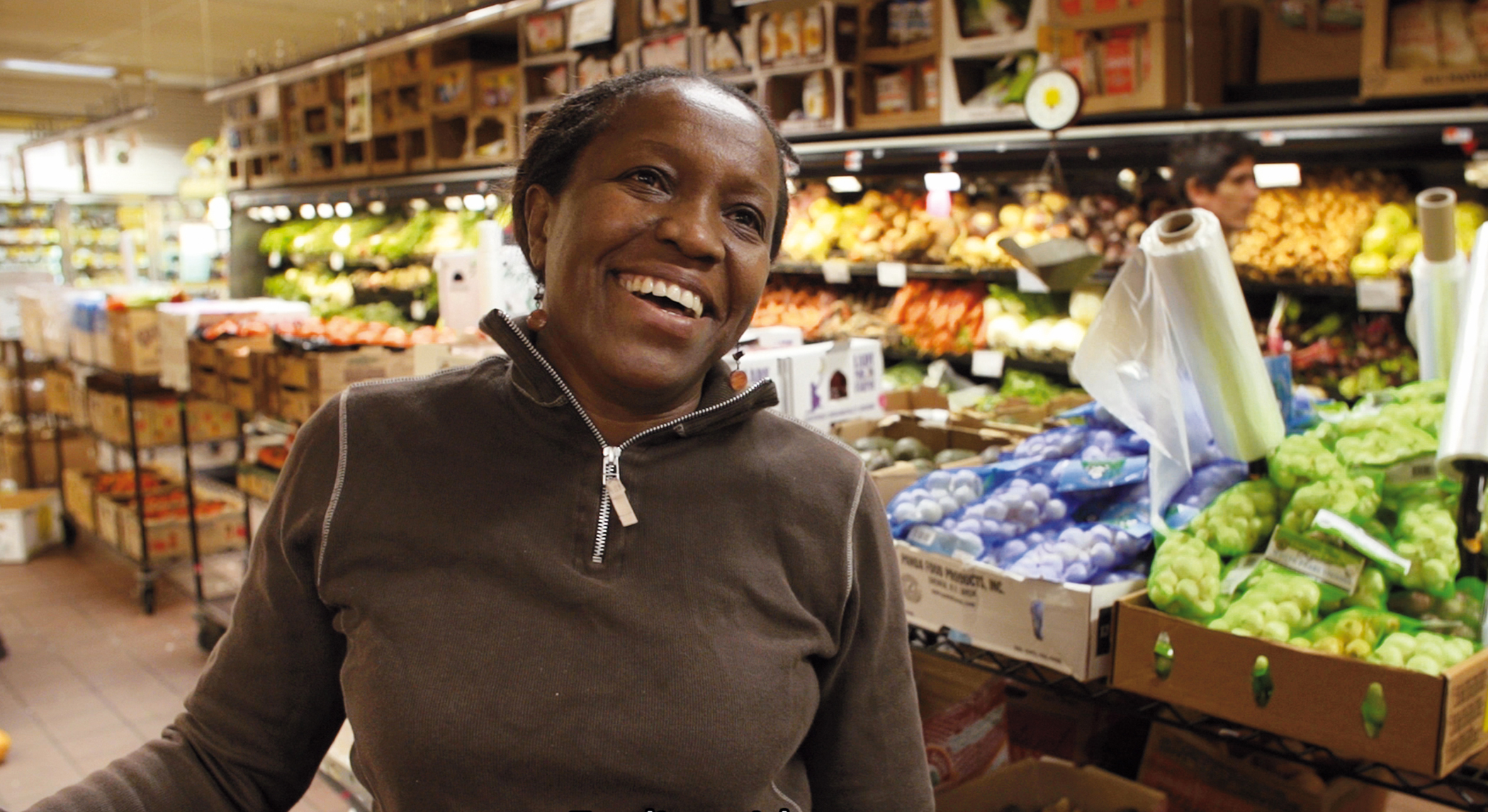
Like any revolution, it takes experimentation, trial and error undergone at great risk, to prove the reliable, rational, and causal relationship between cooperation and economic success. It also takes a willingness to tweak, slightly, the familiar meaning of “success” in the economic sense. Alan Berger, a member of the Park Slope Food Co-op (PFSC) and panelist on the GEO Collective’s recent community conversation in reflection on the movie, describes his draw to the Park Slope Food Co-op as a manifestation of his more general interest in “alternative ways of being.”
At PFSC, “success” isn’t necessarily net income, but unquantifiable outcomes, like the democratization (via affordability) of high-quality food, and the creation of a meaningful community with high levels of engagement. This is what PFSC proves about what an “alternative way of being” a consumer of food can mean.
It isn’t that food cooperatives are dispassionate when it comes to their bottom line, though. Like most businesses, they want to grow. Unlike most other businesses, their growth itself is likely to yield pro-social outcomes. Boothe, who is a founding member of La Louve food co-op in Paris and spoke at GEO’s panel, believes that co-ops can best capture the public through “actions” rather than “talking”. In 19th-century France, he explained, food co-ops used their surplus income to offer healthcare and establish pharmacies. Another panelist, Erin Dale McClellan, president of the Fertile Ground Food Cooperative in Raleigh, articulated this idea when she posited that co-ops “are one of those frontlines.” Co-ops are well-positioned to take traditional economic success (i.e. profit) and transform it into something with more compassionate and democratic public benefits.
It all may sound well and good, but how does PFSC do it?
The balancing act of community building, democratic preservation, maintenance of high-quality products at low prices, and financial sustainability requires the hard work and faith of many.
Member-labor magic
Unbeknownst (surprisingly) to the folks who founded the co-op back in 1973, labor is one of the largest cost categories for conventional grocery stores. You’ll find products marked-up anywhere from 30% to 80% above wholesale prices in your average corporate-controlled market, a margin which both covers these high labor expenses and maximizes corporate profits.
This is where the Park Slope Food Coop’s member-labor structure enables and engenders its impressive downward influence on prices. At the co-op, the vast majority of labor is performed without pay by members, and only those members are permitted to shop. With the savings accrued in their collective labor, the members have democratically voted to apply a flat mark-up of only 25% (with an intention to conditionally return to a previous 21% markup) to every product on the shelf. The result is significant savings and affordable access to high-quality, organic food.
In FOOD COOP, one member actually demonstrates the arithmetic by conducting two identical shops: one at PFSC and the other at Whole Foods. According to her calculations based on this personalized data, it turns out that she and her husband save over $250 a month on groceries, translating into a $30,000 value on a decade of co-op shopping.
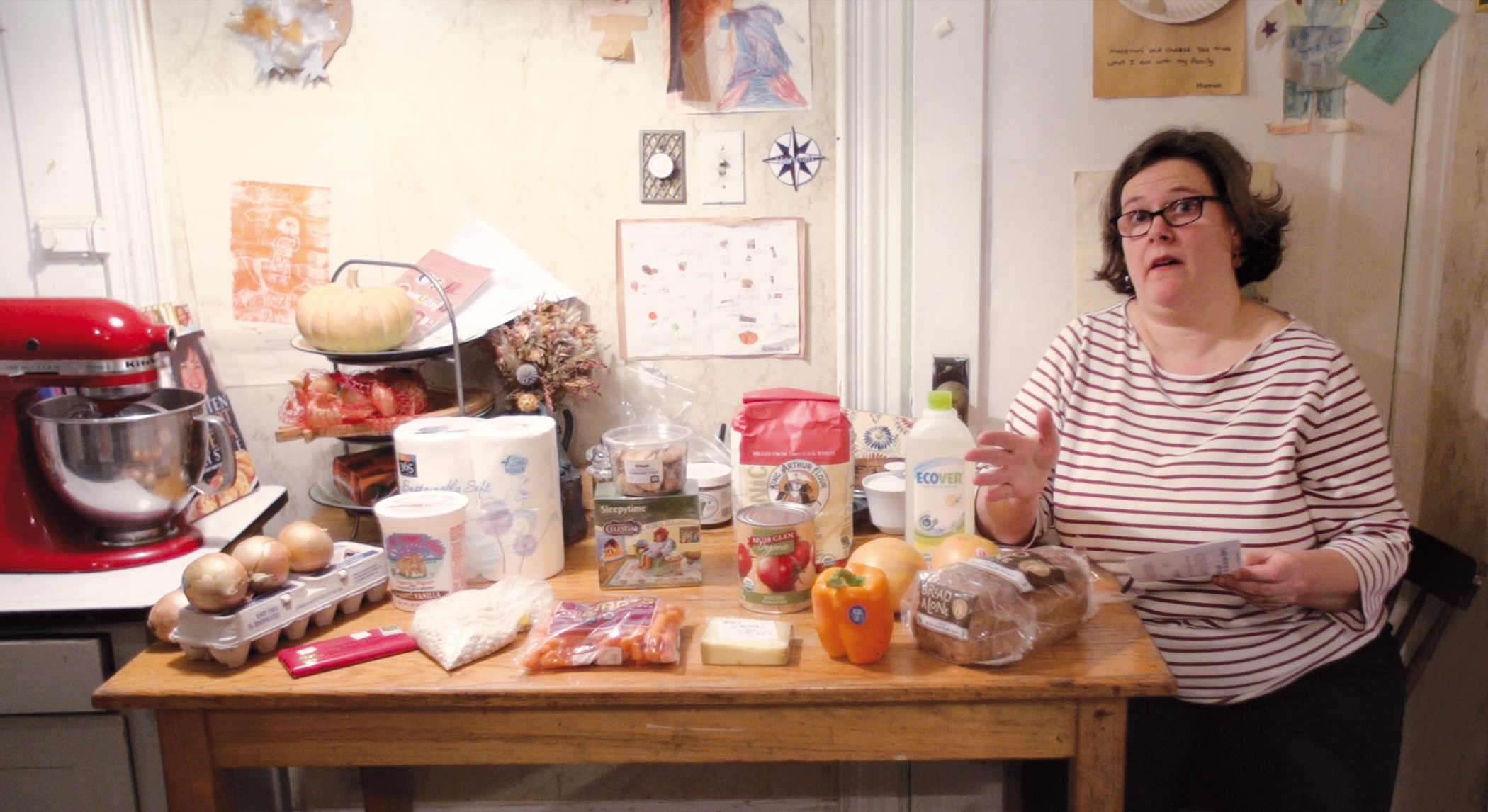
But Joe Holtz, an original founding member of PFSC, doesn’t buy that it’s just the number on the receipt that has compelled over 60,000 people to participate in the co-op over its fifty years of life. Rather he believes it’s the trade of a more profound asset than money that keeps folks around – what Joe dubs “time on Earth.”
Time on Earth, he says, is the singular most precious resource in our possession; as such, most of us tend to be discerning about when and for what we agree to sacrifice it in bulk. By requiring regular contributions of Time on Earth — 2 hours and 45 minutes’ worth every 6 weeks — Holtz believes that members become more viscerally and sustainably bonded to the co-op.
Another exacerbating impact of Time on Earth payments is the coincidental relationships that are formed in the paying of it: we tend to chitchat with the guy who helps us unload a truckful of cantaloupes. We tend to remember our shared effort the next time we eat melon, and look forward to hearing about his son’s birthday party. We may even find our gratitude for the human effort in the supply chain enhanced, making the fresh fruit it delivers us sweeter.
Member-labor is an absolutely central element to the PFSC’s functioning—financially, operatively, and from the perspective of community building. But it’s also one of the less familiar arrangements to many members, especially those of us who are American and were socialized to understand “work” in rigid classifications, split essentially between paid employment and unpaid volunteerism.
PFSC member-labor is neither, really. “It’s a little odd to manage,” explained one member in the documentary whose shift-work, answering phones, entails speaking with members on the phone who called to get out of their shifts. Some communicated their absence with the apologetic, uncomfortable shame of a high-schooler cutting class, or a wage worker who overslept, “expecting someone to be angry about them not coming.” To the contrary: “They don’t work for me,” she says, “We’re all members. They’re not showing up to the thing they’re a part owner of. I don’t have a stake in it, but there’s very much this transference of like, you’re the employer who I’m calling to say I’m not coming in.”
There are paid employees at the co-op, and their relationship with members was a recurring theme of the panel conversation, which brought together co-op activists, members, staff, and others involved in the cooperative movement. Although the conversation didn’t dive into Park Slope’s own recent history of management-labor strife (when asked about the unsuccessful 2019 unionization effort at the co-op, no panelist volunteered knowledge), the panel did explore the complex challenges affecting member-worker cooperation.
One panelist specifically, Elizabeth Jesdale, who’s a paid and unionized staff member of the Hunger Mountain Co-op consumer-owned food co-op in Montpelier, VT, brought the perspective of staff to the conversation around norms, roles, and decision-making authority in the cooperative context. She reminded folks that “the workers know what’s up,” and should be respected as such.
In addition to taking conscientious ownership over contributions to co-op outputs, outcomes, and community decision-making, members of successful co-ops like PFSC must also recognize and respect the autonomy and expertise of their paid staff within the realms of their jurisdictions. For some members who can’t decide whether they’re a customer or a boss, the appropriate balance of responsibility and deference to cooperative staff can be difficult to strike.
The big question
During the panel, the participants took turns tackling a big question: “Why aren’t there more Park Slope Food Co-ops?” It’s a hard question, and a crucial one for the cooperative movement. Year after year in Park Slope, and in other such “egalitarian havens” of food co-ops across the country and world, the democratically-governed and -operated food co-op model has proven its efficacy at supplying good food and low prices. So why, in one panelist’s words, is it “still so easy to say that Park Slope is an anomaly”?
The panelists offered several factors by way of explanation, including lack of access to capital and high real estate prices (Park Slope Food Co-op is lucky to own the space it operates out of, going a long way towards its financial viability). McClellan pointed out that, even when accessible, most capital is offered in the form of “debt which won’t be forgiven.” “What we’re doing,” she says, “is burdening the communities that are closest to the pain with even more debt. We all know that that isn’t a way to liberate communities.” As one path forward, McClellan advocated “reparative strategies” that invest in people themselves and which are not financially extractive.
Other barriers discussed were car culture, which keeps us boxed away from our fellow community members and the anomalous interactions that spark inspiration and occasion for collective action, and a lack of understanding among the general population about co-ops.
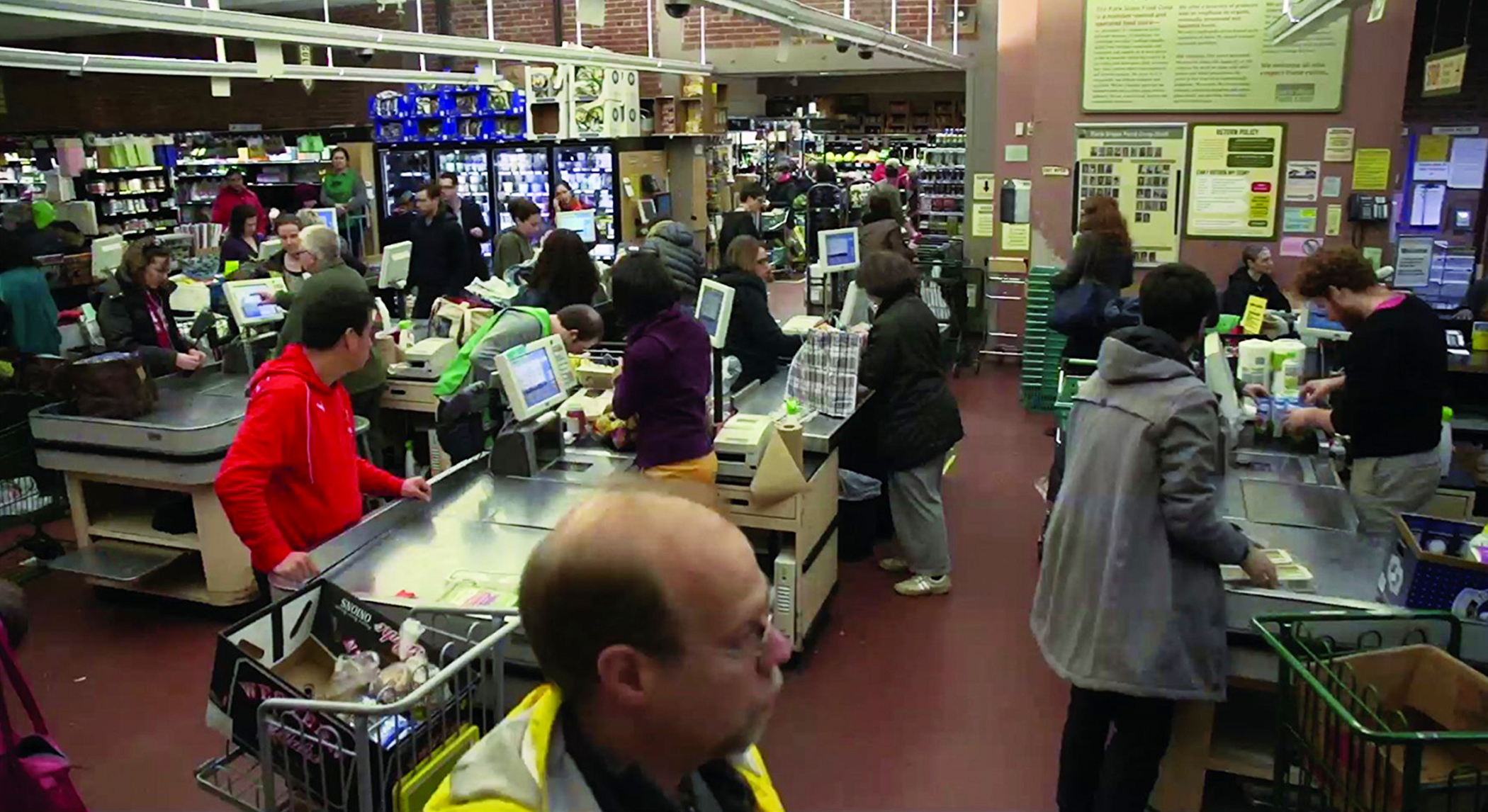
The challenge, though, isn’t just attaining each of these pieces to the puzzle, but making them fit together. Both capital assets and participatory democracy are critical components of successful cooperatives, and each are difficult enough to obtain on their own. But to plug into capital using the instrument of dynamic participatory democracy is an even greater challenge—and one which offers an even greater reward. The Park Slope Food Co-op illustrates the sturdiness of an organization that can marry and generate synergy between these two elements. Big decisions around capital acquisition, for example, are made with the balanced interests of a whole community; once acquired, those assets are then maintained by that community’s diverse – and, compared to wage labor, inexpensive – skillset.
Making democracy democratic
Participatory democracy is, of course, easier said than done– especially on the scale of Park Slope Food Co-op’s 16,000+ members. The co-op has struggled to sustain forums, either physical or virtual, that can accommodate its volume of membership and enable engaged dialogues. Since the pandemic, the co-op’s monthly general membership meeting has been held on Zoom, which, though more accessible and affordable than a physical meeting space, still doesn’t have enough room for everyone. Every member is entitled to participate in every election, but ballots are only mailed to members’ homes for the annual Board elections. Other voting items, frequent and sometimes significant, are effectively only open to those who attend the general membership meeting. A typical month sees about 200 members in attendance, or about 1% of the membership.
PFSC members are working on reforms that will ensure that members’ voices are properly solicited, taken into account, and woven into conversation. The co-op has a robust network of member-committees, whose members clock work hours in overseeing various strands of the cooperative’s activities. The Environmental Committee, for example, was spotlighted in the documentary for its proposal to institute a small surcharge for the usage of plastic produce bags (this effort, more pointedly, was reported to reveal the contentious relationship between the Environmental Committee and the paid staff, who took issue with the inequity of imposing a cost on shoppers which wouldn’t be covered by EBT/food stamps).
However, these committees lack standardized practices for electing and removing members, soliciting ideas from and sharing news with the general membership, and incorporating their feedback. Having developed organically over the course of five decades, the ecosystem of governance bodies at PFSC is dense and well-intentioned, but lacks the efficiency and fairness that could be imposed through a more centralized and standardized governing structure.
During the panel, Boothe discussed the challenges of implementing fundamental changes to a co-op’s governance culture after it had already become entrenched. Aside from all the normal resistances to change, those involved in active committees and other democratic processes in cooperatives often resist any shifts that could imbalance their seats of power and influence. The work to make governance bodies at PFSC more transparent and accessible encounters these challenges, already familiar to most of us as a common political constraint to meaningful change.
A model for survival
During the panel, GEO member Ajowa Ifateyo told us that her favorite scene was one in which an older gentleman mounts his bike outside the co-op storefront. He’s lamenting the uncommonness of the Park Slope model. “After all,” he says, buckling his helmet, “if things keep getting worse, this may be the only way we’re able to eat.” Then he bikes away.
This scene struck me, also. In the food justice and co-op advocacy worlds, it’s far more common to hear utopian images and arguments evoked than the apocalyptic alternative. The mission of our movement is to build a beautiful and equal world; the underlying conviction is that such a world is possible. So to be confronted with the unambiguous and undeniable fact, put so simply—that “things keep getting worse”— how might this particular sentiment and narrative be harnessed?
But the biker isn’t purely pessimistic, and in his less-than-cheery framing I read a meaning which holds not only hope, but also a tangible instruction for progress. When he said the co-op may be “the only way we’re able to eat”, he wasn’t comparing the co-op to a basement doomsday stash, intended to save the lives of those with the foresight to stock it. It’s the model, rather, that’s the saving grace, and the model is really a practice–the practice of sustaining organized and unpaid labor, the democratic processes that facilitate accessible engagement, and a collective investment in upholding community principles.
Unlike a cellar packed with Spam and bottled water, a successful cooperative model can’t be thrown together and forgotten about until The Day Comes. As the overlapping crises of climate change, political polarization, racial injustice, economic inequality, and still others swell and approach, the most productive exercise of preparation may just be the daily practice of these social skillsets. As an alternative to conceiving of co-op building and co-op maintenance as actions of utopian construction, we can also understand them as a regular, preventative and preparatory practice for a future in which, against our best wills, they will only become more necessary for our survival.
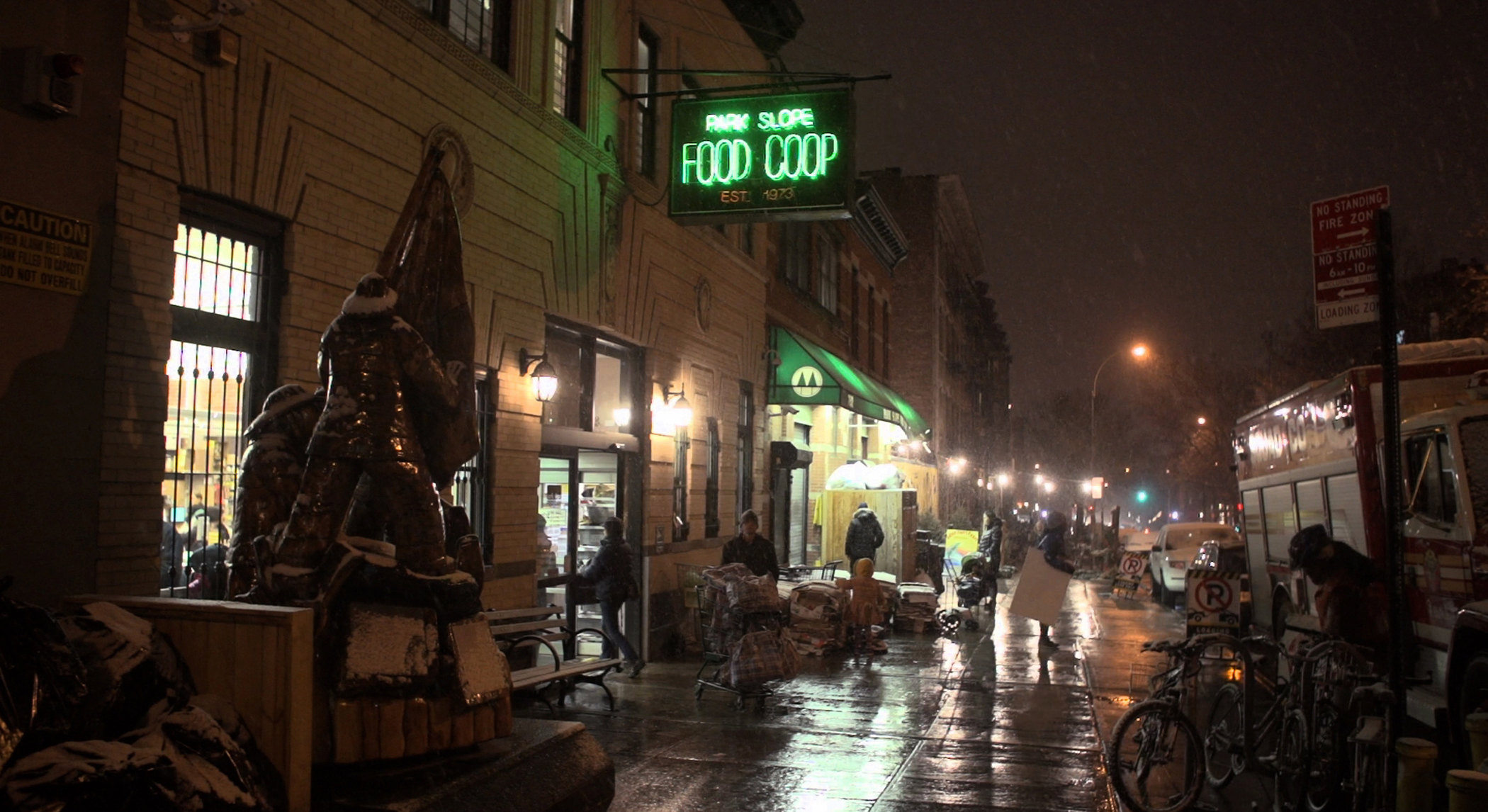
The value of collectively held things
After all, that which is most valuable is that which is necessarily held collectively. Love, for example, which can only exist suspended in the space between two or more people. Friendship, also; trust, teamwork, and peace. It’s obvious that we can achieve more from a coordinated posture—so these things both enable and arise from productivity.
But productivity is only defensible by capitalism’s logic so long as we’re pursuing the right outcomes, and identifying the right metrics. Perhaps that’s why Boothe felt, in his words, “that the stores I was shopping at were somehow wrong.” There are many right answers to the question, “What does it mean to be economically successful?”, and there are probably some wrong answers also. On their own accord, the members of Park Slope Food Co-op have selected to pursue high-quality food, accessible prices, community transparency, and member accountability as the goals of their shared economic enterprise. No community is perfect, but after fifty years of cooperative growth, it’s continued to feel pretty right to the Park Slope members.
All images taken from FOOD COOP.
Citations
Emma Karnes (2022). If You Really Want Good Food, You Have to Work Here: A Community Conversation about the Park Slope Food Co-op. Grassroots Economic Organizing (GEO). https://geo.coop/articles/if-you-really-want-good-food-you-have-work-here


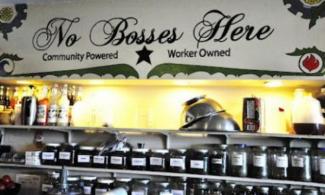
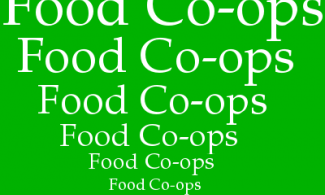

Add new comment